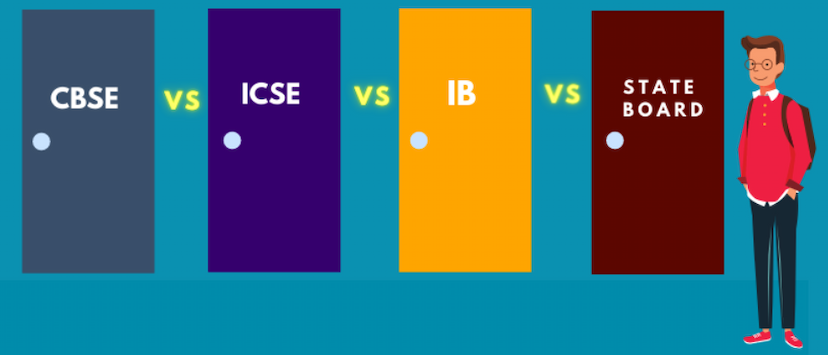CBSE vs. All: Why This Curriculum is best for Competitive Aspirants

In the labyrinth of India’s education landscape, where students navigate a multitude of curricula, the Central Board of Secondary Education (CBSE) stands tall as a beacon of academic excellence. As the pursuit of success in competitive exams becomes increasingly challenging, CBSE emerges not just as a choice but as a reigning champion.
This introduction unravels the compelling narrative of why CBSE reigns supreme for aspirants gearing up to conquer the competitive academic realm. In the quest for victory, it emerges not merely as a curriculum but as a formidable ally, guiding students towards triumph.


Statistical Analysis
A comprehensive report from the National Institute of Educational Planning and Administration sheds light on the substantial variation in syllabus content among different education boards. The deviation, reaching up to 50% from the national curriculum, emphasizes the need for a standardized approach.
The Ministry of Education’s data further supports the superiority of CBSE, revealing a significant performance gap. In the Joint Entrance Examination (JEE) Mains 2020, CBSE students boasted an impressive pass percentage of 24.23%, while a mere 6.2% of state board students qualified for JEE Advanced.

Key Advantages of CBSE Curriculum
Let’s review the major benefits as it is Known for its consistency and standardization countrywide, CBSE guarantees a level playing field, comprehensive learning, and a firm foundation, helping students to flourish in competitive examinations.
Standardization and Accessibility:
The CBSE curriculum is meticulously designed to ensure uniformity and standardization across the nation. This approach guarantees that students, irrespective of their geographic location or school, have equal access to the same high-quality content. The elimination of disparities in learning provides students with a level playing field and prepares them uniformly for competitive exams.

Comprehensive and Well-Structured Design:
CBSE is known for its broad and well-structured curriculum, which has a solid reputation. With its extensive coverage of many disciplines and themes, it enables students to develop a strong knowledge base in a broad array of academic fields. This not only facilitates test preparation but also cultivates analytical and critical thinking skills—crucial qualities for achieving success in competitive examinations
Regular and Thorough Assessments:
A distinguishing feature of the CBSE system is its commitment to regular assessments and examinations. This consistent evaluation allows students to monitor their progress, identify strengths, and address weaknesses effectively. The standardized testing system ensures that students are well-prepared for the multifaceted challenges posed by competitive exams.

Adaptability through Regular Updates:
The dynamism of the CBSE curriculum is reflected in its regular updates and revisions to align with changing trends and the evolving landscape of higher education and the job market. This commitment ensures that CBSE students are equipped with the latest knowledge and skills, significantly enhancing their chances of success in competitive exams.

While this curriculum stands out as a robust choice, it’s crucial to explore how it compares with other prevalent curricula in India concerning effectiveness in competitive exams.
CBSE vs. State Boards:
The statistical data indicates that CBSE students outperform their state board counterparts in competitive exams. The significant difference in JEE Advanced qualifying percentages is indicative of the curriculum’s impact on students’ preparedness for challenging examinations. State boards, with their substantial variations in syllabus content, seem to fall short of providing a standardized and comprehensive preparation platform.
CBSE vs. ICSE:
The Indian Certificate of Secondary Education (ICSE) is another prominent curriculum, known for its more detailed and challenging syllabus. However, the complexity might not always translate into better competitive exam performance. The streamlined and standardized nature of CBSE seems to offer a more balanced approach, providing students with the requisite depth of knowledge without overwhelming them with excessive intricacies.
CBSE vs. International Boards:
With an increasing number of international schools offering foreign curricula, a comparative analysis becomes pertinent. While international boards often boast a global perspective, this curriculum remains a preferred choice for its specificity to the Indian education system and its strong focus on preparing students for national competitive exams. The advantage of familiarity with the examination pattern and content structure gives students an edge.

A poignant testimonial from Neha, a student, serves as a testament to the curriculum’s effectiveness. Her journey, marked by a notable improvement in grades and heightened confidence after transitioning to a CBSE school, underscores the positive impact of the curriculum on individual student experiences.
Additionally, the blog explores the advantages of CBSE over other school boards, emphasizing its instrumental role in facilitating success in top national competitive exams such as JEE, NEET, and AIPMT.
End Note
In the grand symphony of education, where notes of competition and knowledge harmonize, the curriculum emerges as the undisputed conductor. As we traverse the realm of competitive aspirations, the data, testimonials, and comparative insights paint a vivid portrait of its supremacy.
It is not merely an educational framework; it is a catalyst propelling aspirants towards their academic zenith. In the orchestra of varied curricula, it not only plays the tune of success but conducts a symphony that resonates with the aspirations of competitive minds, making it the unrivalled choice for those who dare to dream and aspire to conquer.
Also, read Top 15 Competitive Exams for School Students






